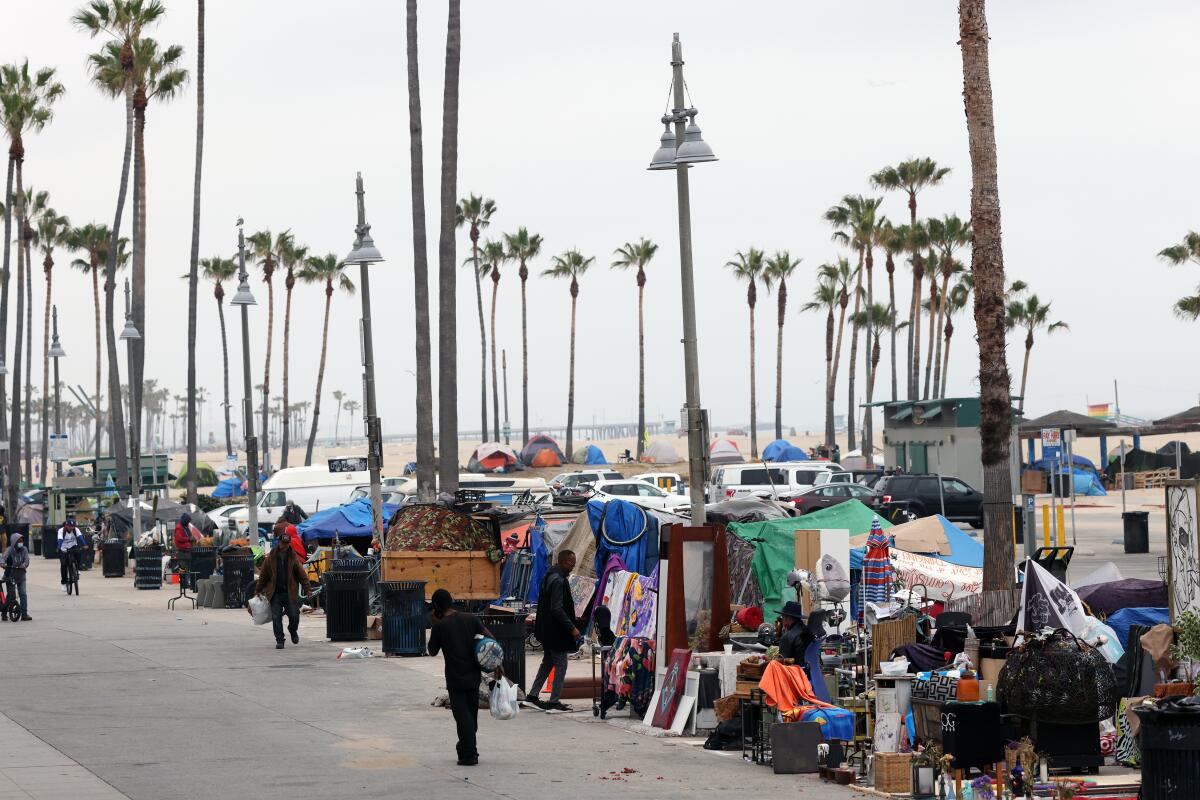Listen to the neighbors of homeless encampments. We aren’t just grousing

- Share via
One day last month, an RV parked outside Westside Neighborhood School in Playa Vista caught fire and burned to ashes just after 3 p.m., as parents had gathered to pick up their children from school. Less than a week earlier, during the morning drop-off period, a dead body was discovered in an encampment outside the same school.
This is the scene in and around Venice, a 3.5-square-mile neighborhood that in 2020 had 1,900 unsheltered homeless individuals, more than any other area in L.A. except skid row. This is the backdrop as we are living our lives, raising our children, trying to care for our neighbors. Our city leaders and “experts” say that the surge of homelessness is caused by housing costs and scarcity, but they do not see what we see.
When you see somebody passed out in their own vomit, or someone who is covered in feces and urine, and there are needles and filth on the streets, you know that’s not a manifestation of poverty or a housing shortage — that’s mental illness and drug addiction. And it’s scary. These people are suffering, and the situation is dangerous for everyone around.
To better understand the problems and possible solutions, I have reached out to other concerned Californians over the past year. Our problem here in Venice is not unique.
Just look at the Tenderloin district of San Francisco, where Mayor London Breed has finally declared a state of emergency to speed up assistance to people there who are struggling with addiction.
For too long, elected officials have refused to look at street homelessness as anything other than a symptom of the state’s housing crisis. That’s one reason I joined the California Peace Coalition, which advocates for the creation of a statewide agency to tackle the problems of homelessness, drug addiction and untreated severe mental illness. Our hope is that a unified, adequately funded, statewide approach would provide more of what is needed, including recovery services, medically assisted drug treatment, psych beds, conservatorship, assisted outpatient treatment and residential care facilities.
In the meantime, city officials must do better. The track record of the past two years is pitiful.
After the pandemic hit and the city stopped enforcing anti-camping laws, Venice residents witnessed the rapid proliferation of over 200 tents on the Venice Beach boardwalk this past summer — along with the creation of a major open-air drug scene, along with a triple-digit increase in robberies and soaring rates of other crimes.
The Los Angeles City Council spent $5 million in outreach services to clear the Ocean Front Walk encampment in the summer of 2021, moving homeless individuals into temporary hotel rooms and forcing those who did not accept housing to move on. Shortly thereafter, more than 70 tents sprang up in Westchester Park, near Los Angeles International Airport. As with the boardwalk encampment, the surrounding residents grew frustrated with the sudden spike in crime, open air drug use and trash — and the city eventually spent $1.1 million in outreach to move individuals into temporary hotels.
I recently counted more than 25 tents outside the Venice library, and I wondered how long it will be until the city allocates funds to clear this area next.
Those of us who live alongside the homeless individuals see firsthand the failure of our city and county rules, regulations, legal interpretations and budget priorities. When we bear witness to issues like the open-air drug scenes that keep popping up, and we try to advocate for the safety of housed and unhoused neighbors alike, we are dismissed as “NIMBYs” by city officials and homeless advocates as though we are complaining about an eyesore.
Critics tell us that we must “be more compassionate,” yet the government’s myopic framing of the issue has only enabled drug addiction and deaths of despair. The strategy of temporary housing is not compassionate. Without real interventions, it guarantees one thing: that many of the Californians living on our streets will die on them.
Fortunately, 2022 will present frustrated voters in Los Angeles with a major opportunity to elect a new mayor, city attorney and council members who are willing to see what this crisis isn’t and can tackle it through the prisms of addiction treatment and mental health care.
Just because RV and encampment fires have become commonplace in Venice does not mean that the voters have accepted this dereliction. Another RV, which had been parked near my home for the past year and a half, exploded in flames on Dec. 18. Someone graffitied the charred remains with the name “Boninville,” an homage to Los Angeles City Councilmember Mike Bonin, whose constituents are trying to recall him, frustrated by the homelessness crisis.
Angelenos are making it clear they care too much for their community to let this chaos and suffering become the new normal.
Soledad Ursúa is an elected board member of the Venice Neighborhood Council.
More to Read
A cure for the common opinion
Get thought-provoking perspectives with our weekly newsletter.
You may occasionally receive promotional content from the Los Angeles Times.









